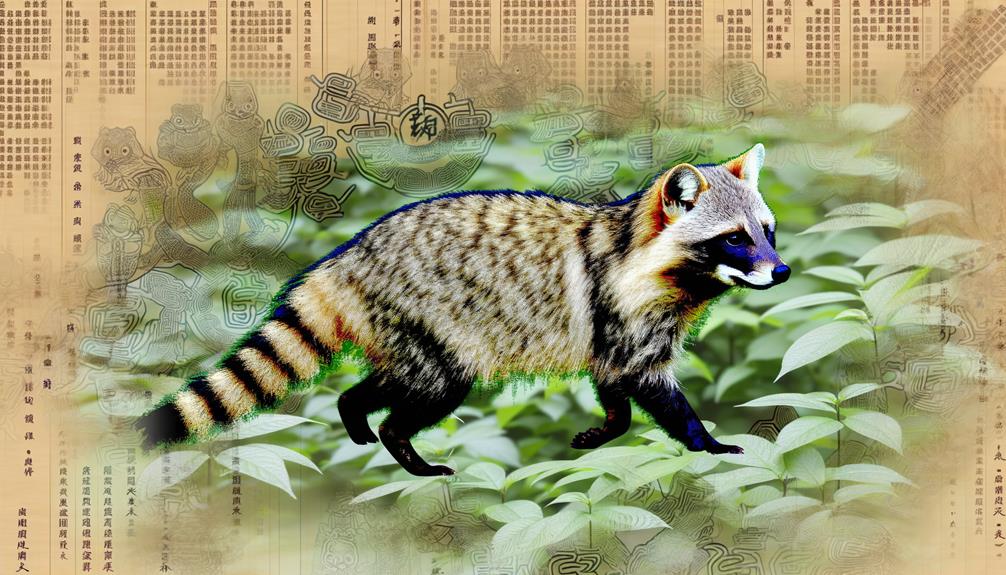Understanding the Cultural Context of Raccoon Dogs Eaten in China
In China, raccoon dogs have historically been utilized in traditional culinary and medicinal practices, particularly in rural communities and certain ethnic minority regions. These animals hold cultural significance, often symbolizing cunning and adaptability in Chinese folklore.
While consumption has diminished in urban areas due to modern influences and environmental concerns, some rural regions maintain these traditions. Ethical concerns and conservation efforts have also influenced contemporary views and regulations surrounding their use.
Food safety and health implications are critical considerations. To gain a deeper understanding of the complexities surrounding this practice, one can explore its multifaceted cultural and legal dimensions.

Key Takeaways
- Raccoon dogs have historically been consumed in China, particularly in rural areas, based on traditional Chinese medicine principles.
- Consumption practices vary regionally, with some provinces incorporating raccoon dogs into traditional culinary dishes.
- Urban consumption has declined due to global culinary influences and heightened environmental concerns.
- Ethical and wildlife conservation concerns have led to stricter enforcement of national wildlife protection laws.
- Health risks, such as zoonotic diseases and food safety issues, are significant considerations in the consumption of raccoon dogs.
Historical Context

Historically, the consumption of raccoon dogs in China can be traced back to ancient times, when various wild animals were integrated into local diets due to both necessity and tradition. The practice arose in agrarian communities where access to meat was limited, prompting reliance on available wildlife.
Raccoon dogs, native to East Asia, became one of many species utilized for sustenance. This integration was influenced by the principles of Chinese medicine, which ascribed various health benefits to different animal parts. Understanding this historical context requires an appreciation of the socio-economic conditions and cultural beliefs that shaped dietary practices.
This nuanced view helps to dispel misconceptions and provides a detailed understanding of why such practices emerged and occasionally persist.
Regional Practices
Regional practices in China regarding the consumption of raccoon dogs reveal a complex tapestry of traditional culinary uses that vary notably across different areas.
These regional dietary differences are deeply rooted in local customs and historical availability of the species.
Today, the cultural significance of consuming raccoon dogs continues to evolve, reflecting both enduring traditions and modern ethical considerations.
Traditional Culinary Uses
In various Chinese provinces, raccoon dogs have been incorporated into traditional culinary practices, reflecting a deep-seated cultural heritage and regional diversity in food preferences. This usage is deeply intertwined with historical and social contexts, where specific dishes symbolize more than sustenance. These culinary practices evoke a sense of nostalgia and communal identity.
Family gatherings: Traditional recipes often emerge during festive occasions, bringing families together.
Medicinal beliefs: Some communities believe raccoon dog meat has health benefits, linking food to wellness.
Rituals and ceremonies: Specific dishes are prepared for ancestral rituals, embedding cultural continuity.
Local festivals: Culinary traditions are showcased, celebrating regional uniqueness.
Oral history: Recipes passed down through generations, preserving cultural narratives.
Understanding these practices offers valuable insight into the cultural fabric of these regions.
Regional Dietary Differences
The integration of raccoon dogs into the Chinese diet varies significantly across different regions, reflecting localized culinary customs and environmental factors.
In northern provinces such as Heilongjiang and Jilin, the consumption of raccoon dogs is more prevalent, influenced by historical hunting traditions and the harsh climate that encourages diverse protein sources.
Conversely, in southern regions like Guangdong and Fujian, where seafood and poultry dominate local cuisines, raccoon dogs are less commonly consumed.
Rural areas, where access to diverse fauna is greater, might incorporate raccoon dogs into traditional dishes, while urban centers often follow modern dietary trends that exclude such practices.
This regional variance underscores the intricate interplay between environment, tradition, and contemporary influences in shaping dietary habits across China.
Cultural Significance Today
Amidst China's diverse culinary landscape, raccoon dogs hold varying degrees of cultural significance, often intertwined with local traditions and historical practices. In some regions, the consumption of raccoon dogs is less about sustenance and more about cultural expression, often linked to folklore and seasonal rituals.
- Rural communities: Revered as symbols of resourcefulness, raccoon dogs are sometimes featured in local feasts.
- Ethnic minorities: Some minority groups incorporate raccoon dogs in traditional ceremonies, reflecting their unique culinary heritage.
- Historical reverence: Historically, raccoon dogs were part of medicinal food practices, believed to hold curative properties.
- Urban trends: Modern urban centers see a decline in their consumption, often replaced by global culinary influences.
- Environmental concerns: Increased awareness about wildlife conservation impacts their cultural role.
Understanding these nuances offers a richer appreciation of regional practices.
Cultural Significance

The cultural significance of raccoon dogs in China encompasses historical usage, symbolism in folklore, and traditional practices.
Historically, raccoon dogs have been utilized for their fur, which holds economic and social value.
In folklore, they are often depicted as shape-shifting tricksters, reflecting complex cultural narratives and traditional beliefs.
Historical Usage
Throughout Chinese history, the raccoon dog has intermittently held cultural significance, often being associated with various traditional practices and beliefs. Its historical usage is multifaceted, reflecting the complex relationship between humans and animals in Chinese society.
Importantly, the raccoon dog has been utilized for:
- Medicinal purposes: Traditional Chinese medicine often ascribed health benefits to its body parts.
- Craftsmanship: Its fur was highly valued for making warm clothing and accessories.
- Cuisine: In some regions, raccoon dogs were consumed, albeit not as a staple.
- Agricultural roles: They were sometimes kept for pest control due to their diet.
- Ritualistic activities: Various ceremonies incorporated raccoon dog elements, underscoring their spiritual significance.
These diverse uses highlight the raccoon dog's enduring presence in Chinese cultural history.
Symbolism in Folklore
Raccoon dogs, beyond their utilitarian roles, have also occupied a prominent place in Chinese folklore, often symbolizing cunning and adaptability. These creatures are frequently depicted as shapeshifters capable of assuming human forms, a characteristic that underscores their ingenuity and resourcefulness.
In various folktales, raccoon dogs use their shape-shifting abilities to outwit adversaries, reflecting cultural values that prize intelligence and flexibility. This symbolism is deeply embedded in Chinese storytelling traditions, where raccoon dogs serve as metaphors for overcoming adversity through wit rather than force.
Such representations highlight the nuanced perspectives within Chinese culture, where animals are not merely resources but also embody complex human traits and moral lessons, enriching the collective cultural heritage.
Traditional Practices
Traditional Chinese practices surrounding raccoon dogs reveal a complex interplay of cultural beliefs, historical contexts, and utilitarian values. These animals hold various roles within Chinese society, from folklore to practical uses.
Historically, raccoon dogs have been hunted for their fur, prized for warmth and status. They have also been depicted in art and literature, symbolizing cunning and adaptability. Additionally, raccoon dogs have been used in traditional medicine, believed to possess healing properties. In some rural areas, they have been kept as pets, reflecting a bond with nature. Although less common today, raccoon dogs have also been occasionally consumed as food.
This multifaceted relationship underscores the raccoon dog's cultural significance, offering insights into human-animal connections deeply rooted in tradition. Sensitivity to these practices enhances our understanding of China's rich cultural tapestry.
Modern Consumption
In contemporary China, the consumption of raccoon dogs is relatively uncommon and largely restricted to specific regions and culinary contexts. This practice is mainly observed in rural areas where traditional food customs persist.
Urbanization and changing dietary preferences have led many to favor more conventional meats like pork, chicken, and beef. Culinary use of raccoon dogs is often tied to local festivals or traditional medicinal beliefs, where the animal is believed to possess health benefits. However, this remains a niche aspect of Chinese gastronomy.
The modern Chinese diet is increasingly influenced by global food trends, and the consumption of raccoon dogs has not seen widespread acceptance. This reflects broader shifts towards varied and internationalized eating habits in urban centers.
Ethical Considerations

Understanding the ethical considerations surrounding the consumption of raccoon dogs in China requires a nuanced examination of cultural dietary practices and animal welfare concerns. Historically, dietary customs have included a wide range of animals, reflecting regional diversity and traditional knowledge.
Concurrently, growing awareness of animal rights and welfare issues has prompted increased scrutiny and debate, necessitating a balanced discussion that respects cultural contexts while addressing ethical implications.
Cultural Dietary Practices
Cultural dietary practices in China, including the consumption of raccoon dogs, are deeply intertwined with historical, regional, and socio-economic factors that necessitate careful ethical consideration. These practices are influenced by various aspects of Chinese society:
- Historical traditions: Centuries-old culinary customs that are passed down through generations.
- Regional diversity: Distinct regional cuisines that reflect local resources and cultural heritage.
- Economic necessity: Food choices shaped by economic conditions and availability.
- Cultural identity: Food as an expression of cultural practices and communal identity.
- Globalization: The impact of international trade and exposure to global dietary norms.
Understanding these elements is essential for a nuanced perspective on dietary practices, fostering respect and empathy for cultural diversity.
Animal Welfare Concerns
Ethical considerations regarding the consumption of raccoon dogs in China necessitate a thorough examination of animal welfare standards and the culturally specific contexts in which these practices occur.
In rural settings, raccoon dogs are often farmed under conditions that may raise ethical concerns about their treatment. Their use in traditional Chinese medicine and cuisine reflects deep-rooted cultural practices that complicate the discourse on animal welfare.
While international perspectives may advocate for stricter welfare standards, understanding the socio-economic factors and historical significance in local communities is essential. Balancing cultural sensitivity with ethical imperatives requires a nuanced approach that respects traditions while promoting humane treatment.
Hence, animal welfare concerns must be addressed through collaborative, culturally informed dialogues and policy-making.
Wildlife Conservation
Examining the role of raccoon dogs within China's wildlife conservation efforts reveals both the complexities of preserving biodiversity and the cultural intricacies that influence these initiatives. Raccoon dogs, native to East Asia, face habitat destruction and poaching pressures. Conservationists work tirelessly to protect this species, often encountering challenges unique to China's socio-cultural landscape.
- Habitat loss due to rapid urbanization
- Cultural practices impacting wildlife populations
- Community-driven conservation programs
- Balancing economic development with ecological preservation
- Educational campaigns promoting biodiversity
Understanding these dynamics is critical for effective conservation strategies. Efforts to protect raccoon dogs not only aim to preserve an integral part of China's ecosystem but also to foster a deeper connection between communities and their natural heritage.
Legal Regulations

Understanding the legal landscape surrounding raccoon dogs in China involves a complex interplay of national wildlife protection laws, regional enforcement practices, and international conservation agreements.
Under China's Wildlife Protection Law, raccoon dogs are categorized as a species requiring special state protection. However, enforcement varies significantly across regions, influenced by local cultural practices and economic dependencies.
Internationally, China is a signatory to CITES, which regulates trade but does not outright ban the consumption of raccoon dogs. The complexity is further compounded by grey areas in regulations that allow for loopholes in both farming and consumption practices.
This intricate legal framework requires ongoing dialogue between conservationists, policymakers, and local communities to ensure effective and culturally sensitive wildlife management.
Health Implications
While the legal landscape surrounding raccoon dogs in China is intricate, the health implications of consuming raccoon dogs present another layer of complexity that demands attention.
Consumption of raccoon dog meat poses several health risks that are deeply concerning:
- Zoonotic Diseases: Raccoon dogs are carriers of viruses such as SARS-CoV and other pathogens.
- Parasitic Infections: These animals can harbor parasites like Trichinella spiralis, leading to severe illness.
- Food Safety: Improper handling and cooking of raccoon dog meat can result in bacterial contamination.
- Cultural Practices: Traditional methods of preparing raccoon dog may not align with modern food safety standards.
- Public Health: The potential for outbreaks due to zoonotic transmissions raises significant public health concerns.
Understanding these health risks is essential for informed consumption and policymaking.
Alternative Views

Different perspectives on the consumption of raccoon dogs in China reveal a complex interplay of cultural, economic, and ethical considerations. In some rural communities, raccoon dogs are valued both as a food source and for their fur, a practice steeped in historical traditions.
Contrastingly, urban populations and animal welfare advocates increasingly view the practice through an ethical lens, raising concerns about animal rights and welfare.
Economically, the fur trade provides significant income for certain regions, complicating efforts to reduce consumption. Moreover, globalization and shifting societal values are influencing younger generations, who may prioritize ethical consumption and environmental sustainability.
These diverse viewpoints underscore the multifaceted nature of the issue, requiring a nuanced understanding of the cultural and socio-economic context.
Future Trends
Emerging trends suggest that the future of raccoon dog consumption in China will be shaped by a confluence of evolving cultural attitudes, regulatory changes, and increasing global awareness of animal welfare issues. As younger generations in China become more conscious of ethical considerations, traditional practices may undergo significant transformation.
Government policies are also likely to adapt, reflecting heightened scrutiny over wildlife trade and consumption. Moreover, international pressure and advocacy for animal rights can influence local practices.
- Growing youth activism advocating for animal rights
- Stricter regulations on wildlife trade and consumption
- Increasing popularity of plant-based diets
- Intensified global campaigns against animal cruelty
- Technological advances in alternative food sources
These factors collectively signal a potential shift towards a more humane and regulated approach to raccoon dog consumption in China.
Conclusion
The consumption of raccoon dogs in China, while historically rooted and regionally variable, is like a tapestry woven with threads of cultural significance and modern ethical dilemmas.
Legal regulations and health implications further complicate this practice, revealing a landscape of shifting attitudes and potential future trends.
The interplay of tradition and contemporary values underscores a dynamic dialogue, reflecting broader societal changes and the evolving relationship between humans and animals.






